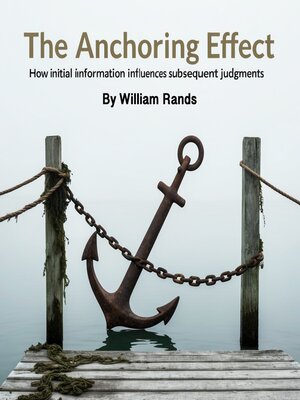The Anchoring Effect
audiobook (Unabridged) ∣ How Initial Information Influences Subsequent Judgments
By William Rands

Sign up to save your library
With an OverDrive account, you can save your favorite libraries for at-a-glance information about availability. Find out more about OverDrive accounts.
Find this title in Libby, the library reading app by OverDrive.



Search for a digital library with this title
Title found at these libraries:
| Library Name | Distance |
|---|---|
| Loading... |
The anchoring effect is a cognitive bias that has significant implications for how people make decisions. It refers to the phenomenon where individuals rely heavily on the first piece of information they receive when making subsequent judgments. This initial information, known as the "anchor," serves as a reference point, influencing how individuals perceive and evaluate all related information. The anchoring effect has been studied extensively in the fields of psychology, economics, and decision science, revealing how it subtly but powerfully shapes human judgment, often without people being aware of its influence.
At its core, the anchoring effect occurs because humans have a natural tendency to rely on available information when making decisions, even if that information is arbitrary or irrelevant. Once an anchor is introduced, people tend to adjust their judgments or estimates based on that anchor, but they often do so insufficiently. This means that their final decision or judgment is still heavily influenced by the anchor, regardless of whether it is logically or contextually appropriate.
Research on the anchoring effect began in the early 1970s with the groundbreaking work of psychologists Amos Tversky and Daniel Kahneman. In one of their most famous experiments, participants were asked to estimate the number of countries in Africa. Before giving their estimates, they were shown a random number (the anchor), such as 10 or 100, and were then asked if the number of African countries was higher or lower than the anchor. The results revealed that participants' estimates were skewed toward the anchor, even though the number was entirely unrelated to the actual question. This experiment demonstrated the power of anchors in influencing judgments, even when they have no logical relevance to the decision at hand.







